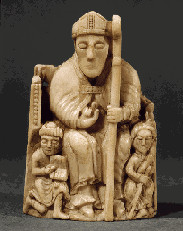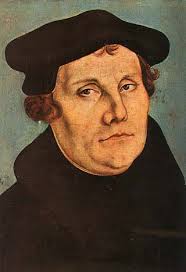Over at Church of the Holy Communion in Charleston, South Carolina, Fr. Dow Sanderson speaks about his decision to remain in the Episcopal Church:
I especially urge those of you who feel that you must leave your church home, in these difficult times, and seek another Anglican “safe haven”. Like so many things in this broken and highly polarized world, some would frame this discussion as simply a choice between Biblical, Orthodox Truth on the one hand, and very progressive, liberals on the other. This simply is not true. In fact, the overwhelming majority of Anglo-Catholics in the United States remain a part of the Episcopal Church and have absolutely no intention of doing otherwise. These would include, of course, very famous places like St. Paul’s in Washington, Church of the Advent in Boston, St. Thomas, Fifth Avenue in New York, St. John’s in Savannah, to name just a few.
What is at stake here is Communion. Anglicanism, in all its expressions, has always claimed to be something more than just a church of the Reformation. Reformed, yes, but through our ties to the ancient See of Canterbury, we have depth of Tradition and continuity with the Apostolic Church that has always been highly valued.
I certainly think that people of good conscience can remain in The Episcopal Church. At the same time, Fr. Sanderson begs a number of questions. Foremost, he states that the question is one of “communion.” But this begs the question, “communion with whom?” The Catholic tradition is quite clear that communion is only possible with those who hold the Catholic faith. One of the better books on this subject is Werner Elert’s Eucharist and Communion in the First Four Centuries (Concordia Publishing House, 2003). St. Athanasius was not in communion with the heretic Arius. St. Cyril of Alexandria was not in communion with Nestorius. St. Augustine was not in communion with the Donatists. After the ecumenical councils of the early centuries, those who refused to subscribe to them were no longer in communion with the Catholic Church. For example, the Copts refused to recognize Chalcedon, and have been out of communion with the Orthodox churches to this day. Rome and Orthodoxy do not agree on the role of the pope, and so they have been out of communion since 1054. And, of course, Anglicans have been out of communion with Rome since Henry VIII.
The second question that Fr. Sanderson fails to address has to do with canon law and the role of the bishop in a diocese. As a priest in a diocese, what is one’s obligation when one’s bishop is deposed for “abandoning the communion” when he has not in fact done so? Bishop Mark Lawrence did not leave the Episcopal Church. He was kicked out. He was kicked out based on the misuse of a canon that was intended to be used for clergy that really had left the Episcopal Church and joined another denomination. But Bishop Mark was actually trying to keep the Diocese of South Carolina in TEC, not leave. In a case of double jeopardy, Bishop Lawrence was re-tried (without a trial or representation) on charges that had already been dismissed a year ago. Presiding Bishop Katharine Jefferts Schori stated that she had accepted “the renunciation of the ordained ministry in the Episcopal Church of Mark Lawrence,” although TEC’s canons state that such renunciation must be received in writing, and Bishop Lawrence has denied that he made such a renunciation.
So the Presiding Bishop’s claim that Bishop Mark had “abandoned the communion,” was, at the least, a very creative interpretation of TEC’s canon law.. To be blunt, Bishop Mark did not abandon communion. TEC broke communion by deposing him. It was only after TEC violated its own canon law by deposing Bishop Mark that South Carolina left TEC. Moreover, the Global South bishops (who represent the majority of bishops in the Anglican Communion) have refused to recognize the deposition of Bishop Lawrence, and they continue to recognize Bishop Lawrence as the legitimate bishop of South Carolina: “We want to assure you that we recognize your Episcopal orders and your legitimate Episcopal oversight of the Diocese of South Carolina within the Anglican Communion.” So the question of “communion” is not a straightforward one.
Given that Bishop Mark’s deposition was contrary to TEC’s own canons, it would seem that Bishop Mark still the legitimate bishop of the Diocese of South Carolina, and, as a priest in that diocese, Sanderson either acknowledges the legitimacy of TEC’s deposition, or not. By placing himself under TEC’s authority in South Carolina, Fr. Sanderson is making a choice. He is choosing to be in communion with TEC. But he is also choosing to refuse to be in communion with Bishop Lawrence, who, until TEC wrongfully deposed him, was Fr. Sanderson’s bishop.
When I lived in Boston, I attended Church of the Advent, which Fr. Sanderson mentions, for a year or so. Fr. Sanderson finds it significant that the Church of the Advent remains in TEC. However, I know something of that story. During the time I lived in Boston, Advent survived a near schism when the unique governing board at Advent (a “corporation,” not an elected vestry) attempted to leave TEC (not over doctrine) and take the building with them. But the majority of the congregation did not agree with the corporation, and the matter went to court. The congregation won. The corporation lost. But that set a legal precedent. The building belonged not to the corporation, but to the diocese. The current congregation at Advent has not left, and could not leave, because they would lose their building to the diocese.
When I attended Advent, the average Sunday attendance (ASA) was around 400. TEC’s statistics page indicates that it is now around 250. So the Church of the Advent has not left TEC. But somewhere around a third of its Sunday attendees have. When I attended, Advent had two kinds of members, those who were serious Anglo-Catholics, and those who attended because they liked the beautiful music and liturgy. I cannot be certain, but I would imagine that the vast majority of those who no longer attend Advent on Sunday mornings were the serious Anglo-Catholics. Those ones who still keep coming are likely those who come for the music.
So what’s my point? My point is not to criticize Fr. Sanderson for his decision to remain in the Episcopal Church. For those of us who are committed to orthodox Anglicanism, and have struggled with the Episcopal Church crisis over the last decade or more, where we end up is never simple. People can stay, and they can leave, and both decisions can be made in good conscience.
At the same time, Communion is important. But communion is also a choice, and a necessary choice that we all must make. To choose to be in communion with some is by necessity to choose not to be in communion with others. If one stays in the Episcopal Church, one has not chosen “communion” over non-communion. One has chosen communion with some (such as Presiding Bishop Katharine Jefferts Schori) over others (such as Bishop Mark Lawrence). Unfortunately, it is impossible to choose both, and I would suggest that it is the Episcopal Church that has forced that decision on the orthodox, not the reverse.
 Almost immediately after the Reformation, Anglicans acknowledged that the distinction between bishops and presbyters is not clearly articulated in the New Testament. Episcopacy was still defended, and a number of similar arguments have been used and repeated, beginning at least from the time of Richard Hooker.
Almost immediately after the Reformation, Anglicans acknowledged that the distinction between bishops and presbyters is not clearly articulated in the New Testament. Episcopacy was still defended, and a number of similar arguments have been used and repeated, beginning at least from the time of Richard Hooker.








